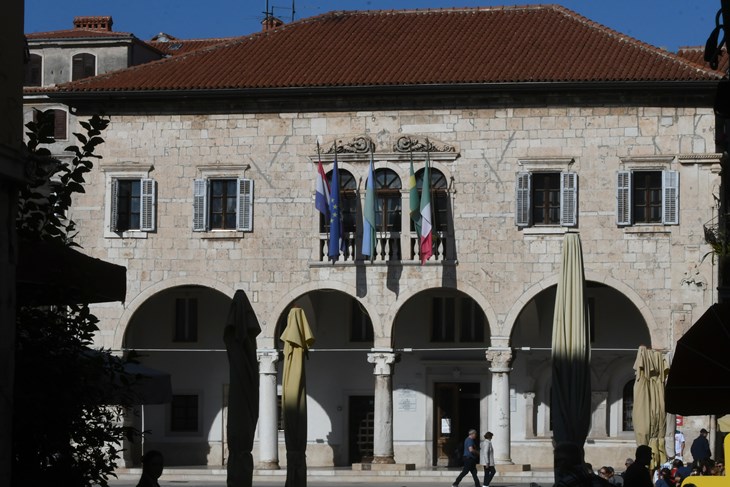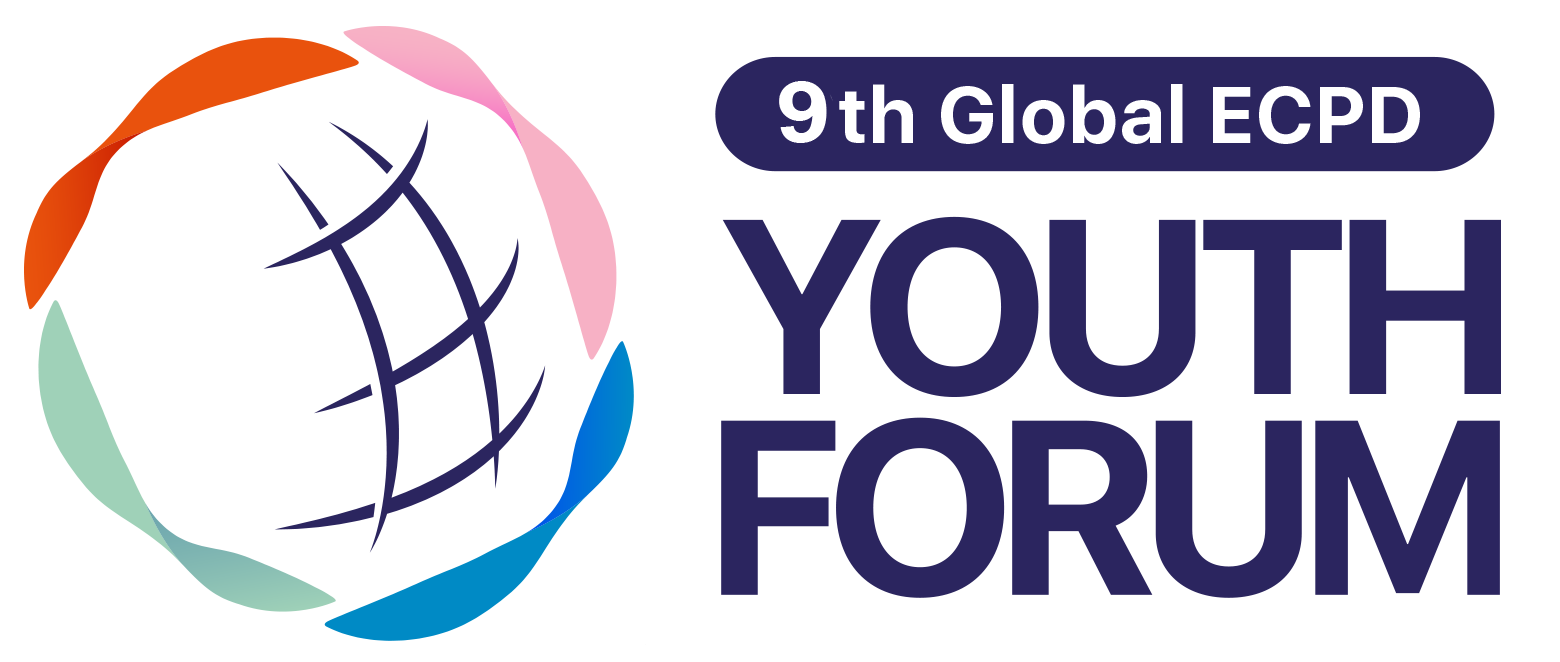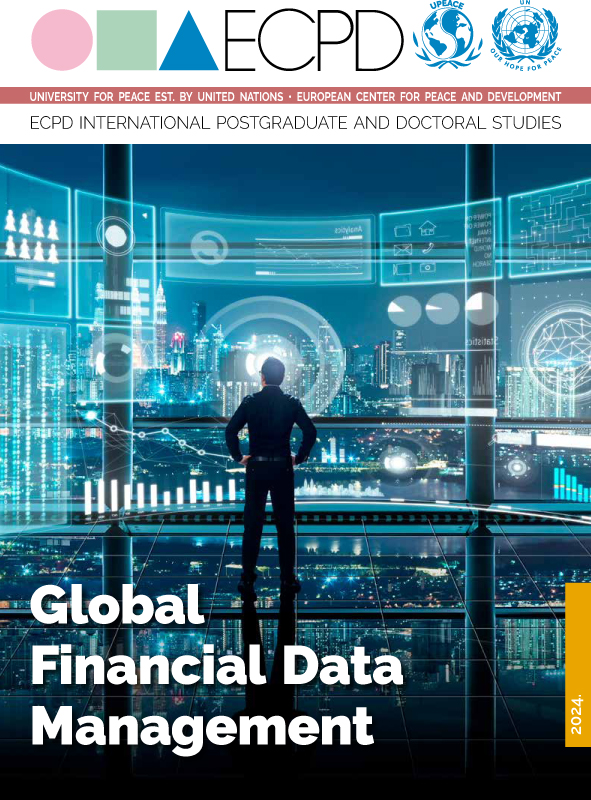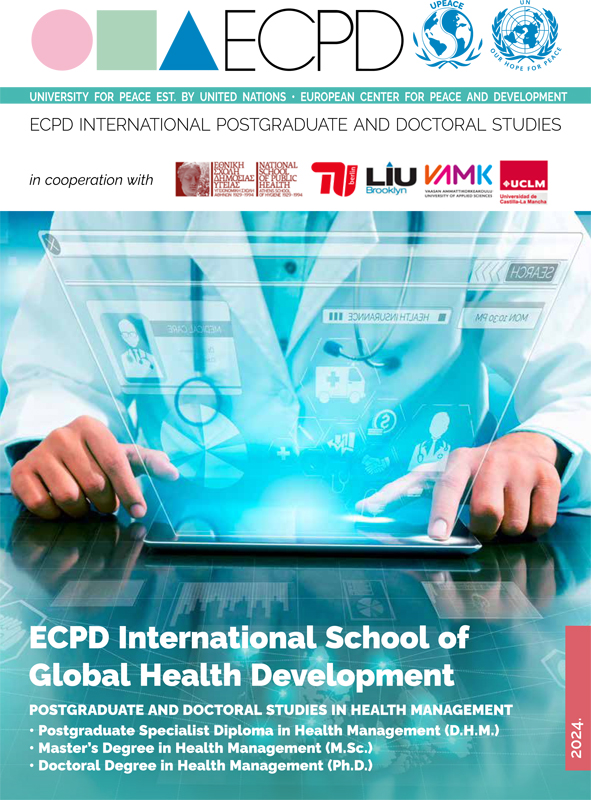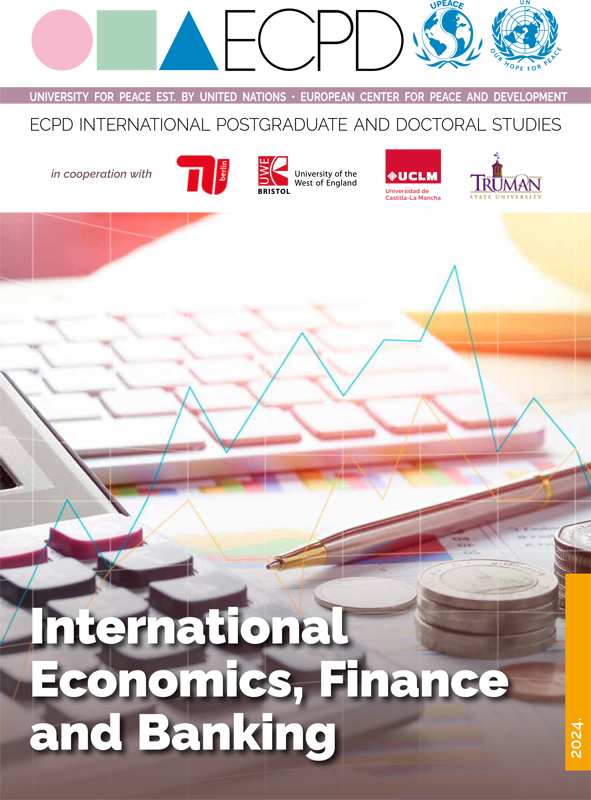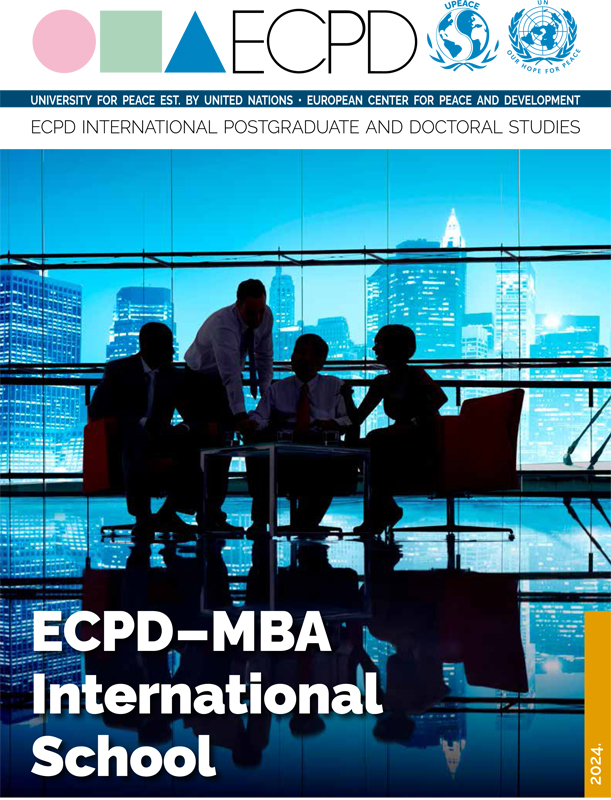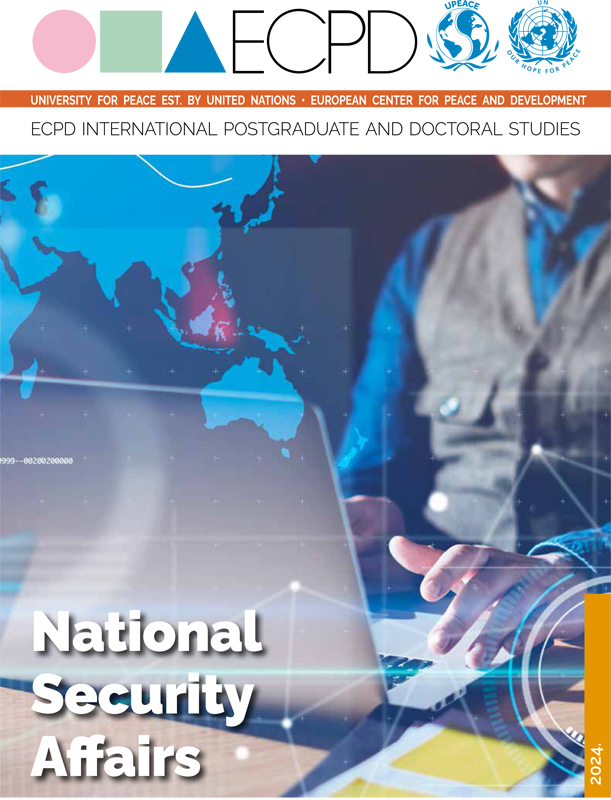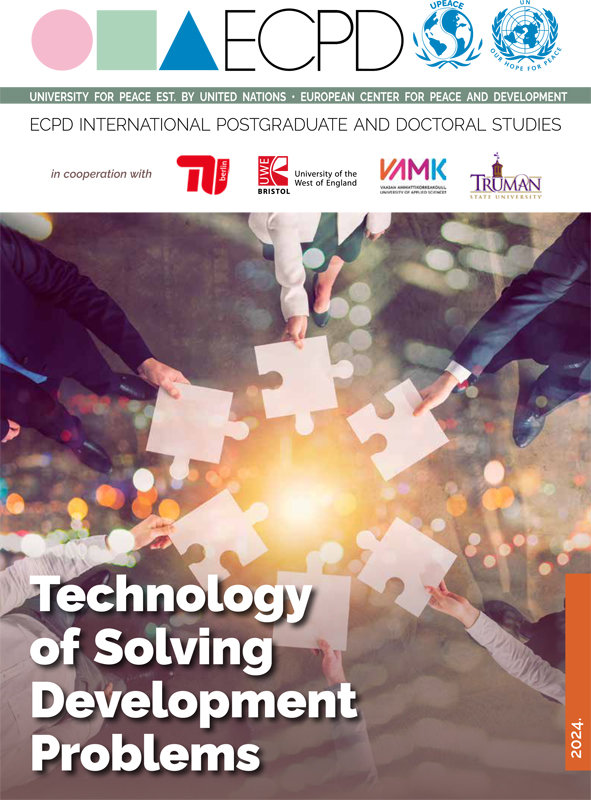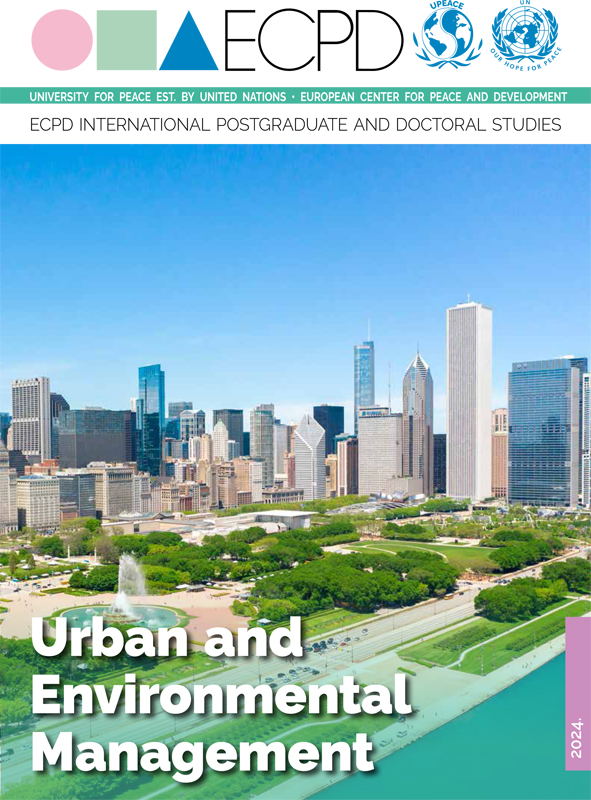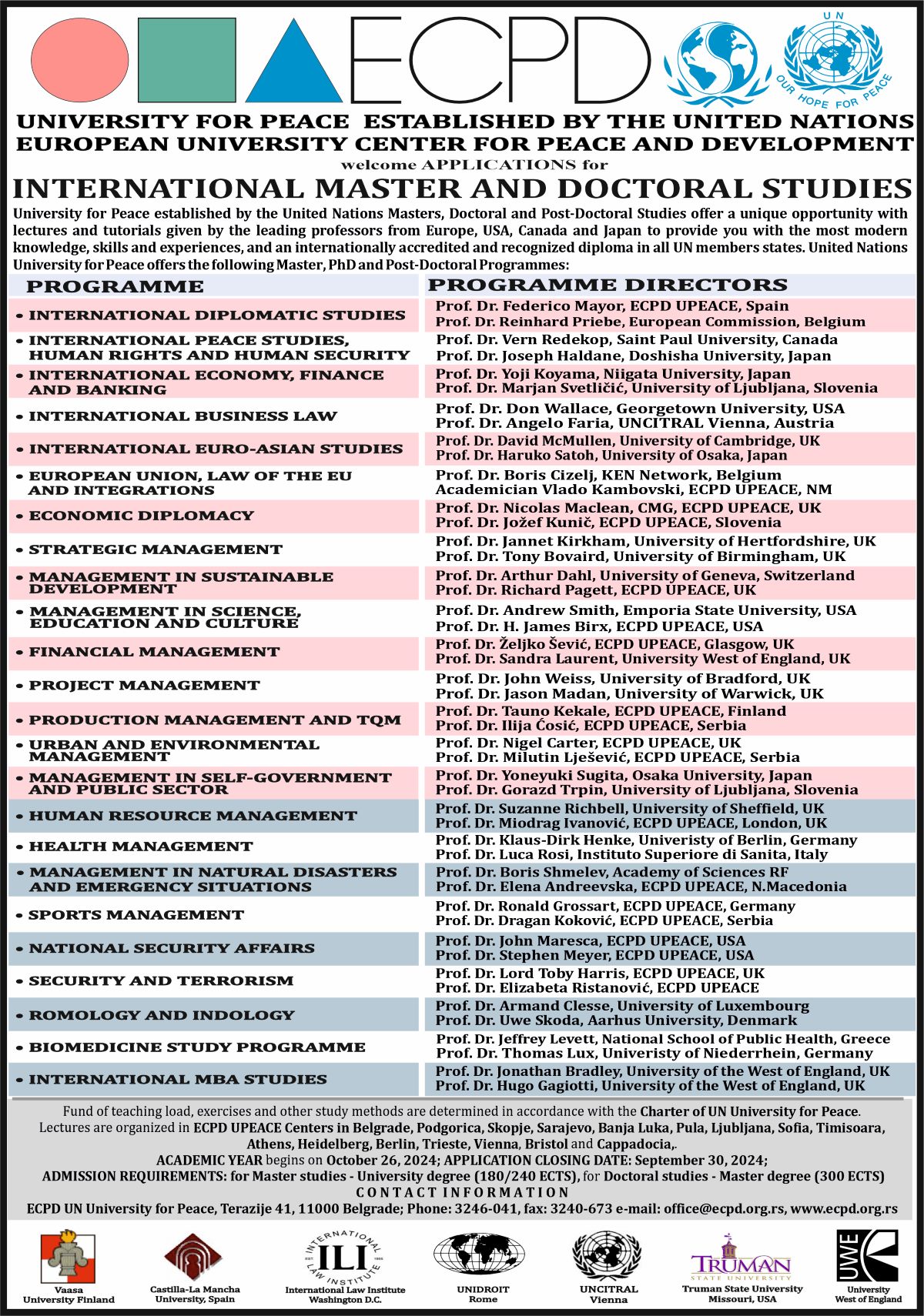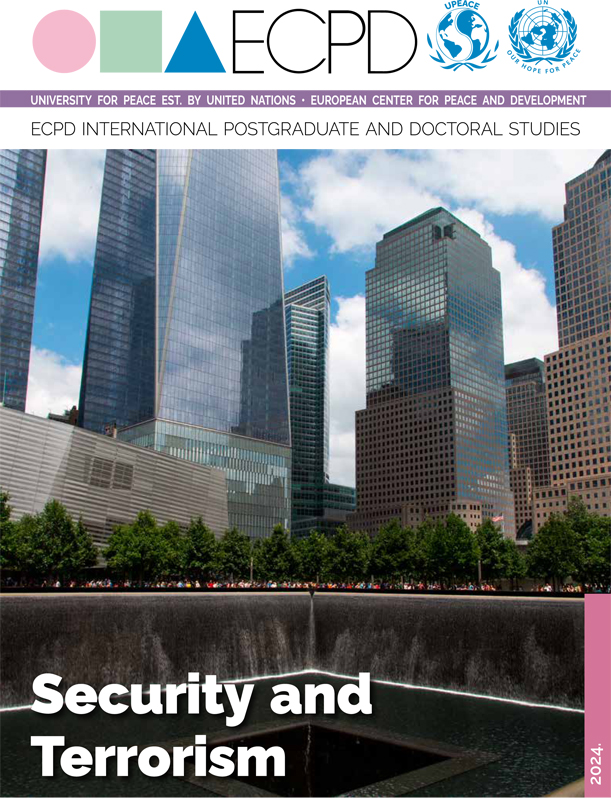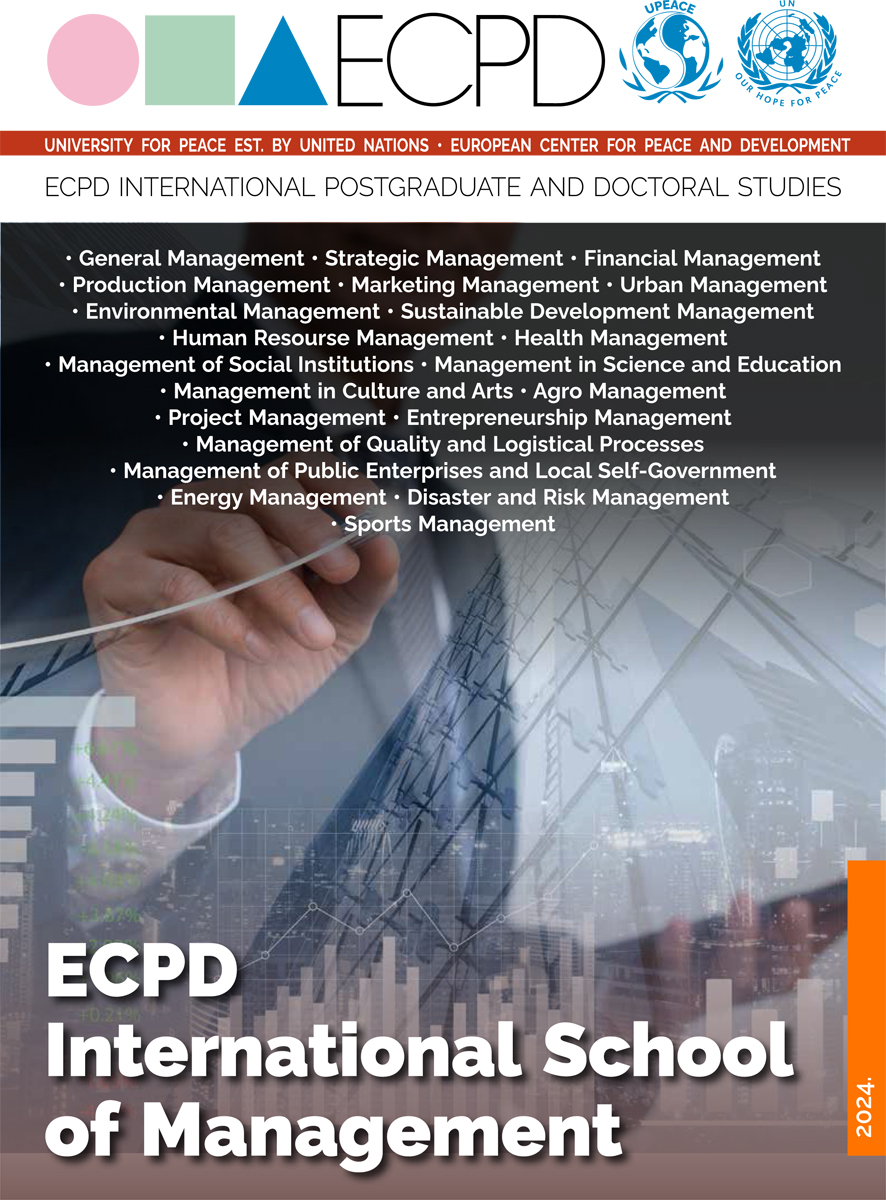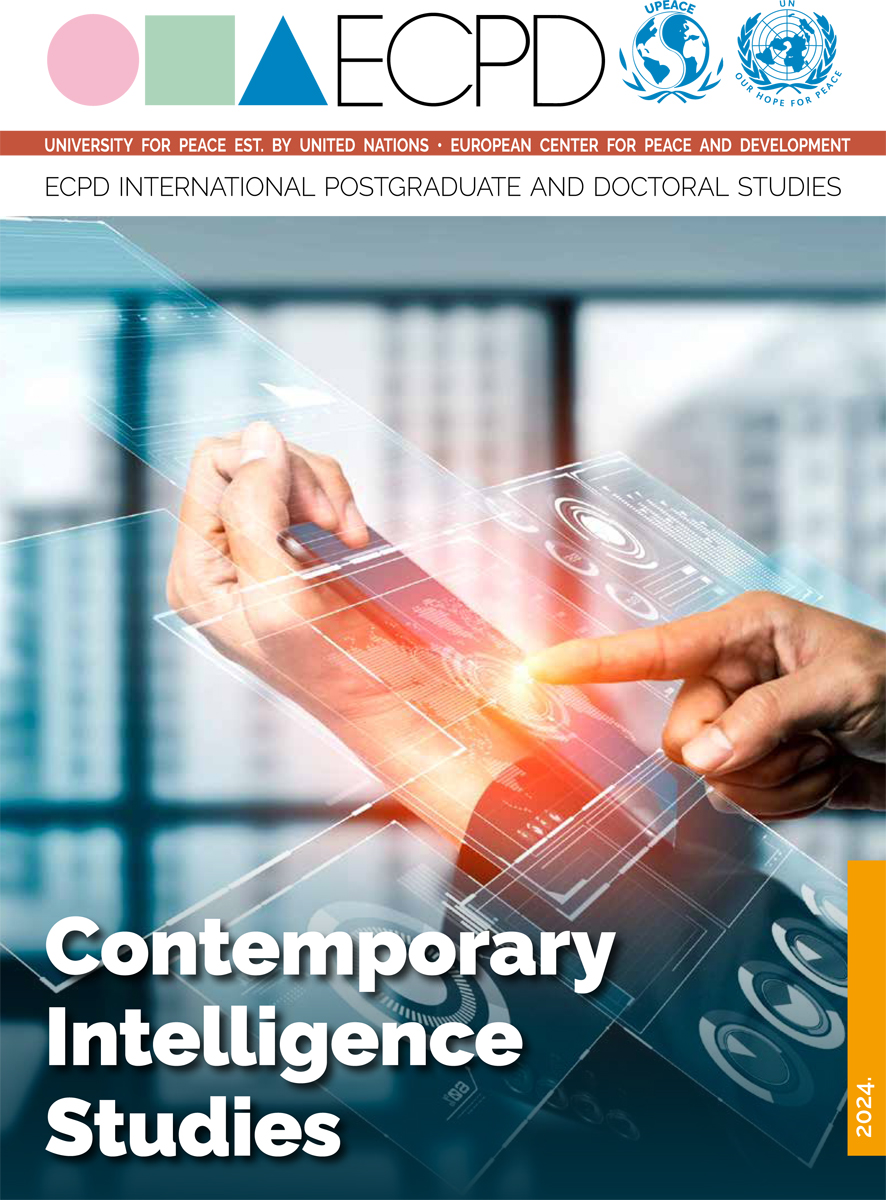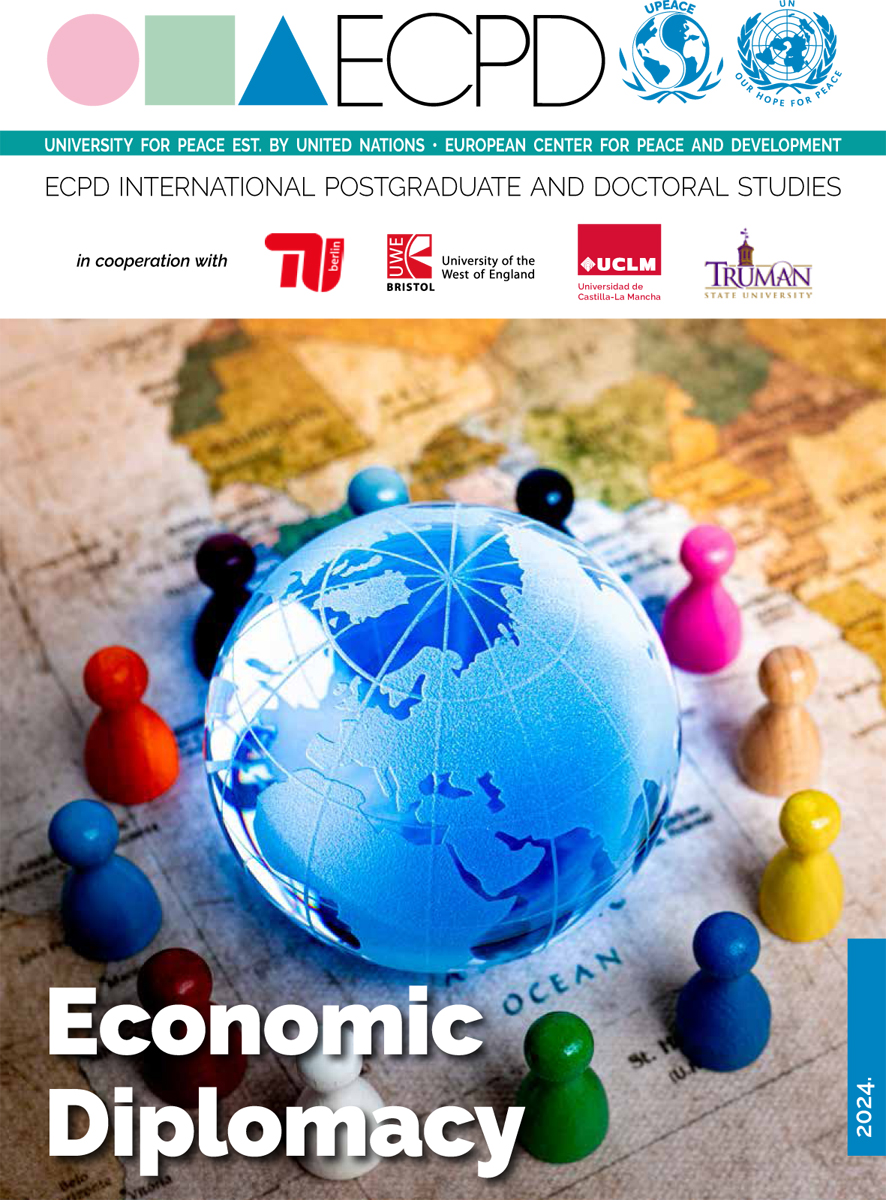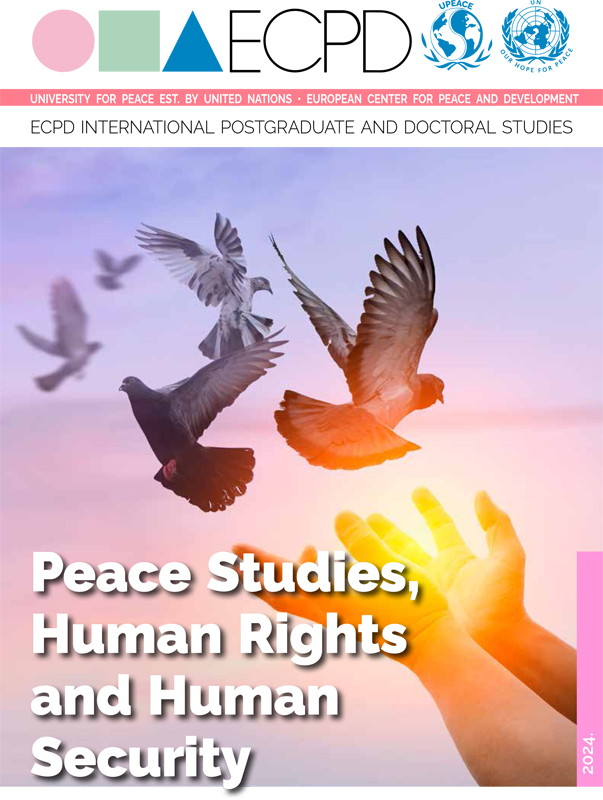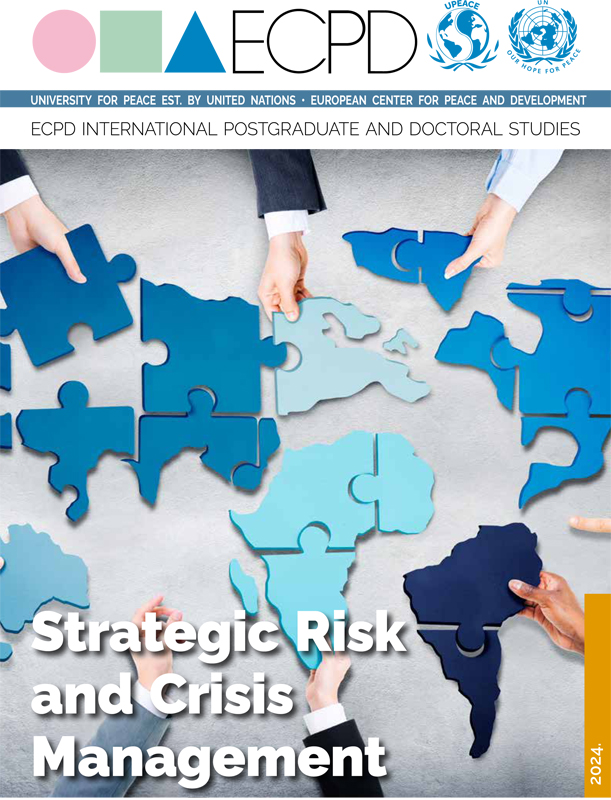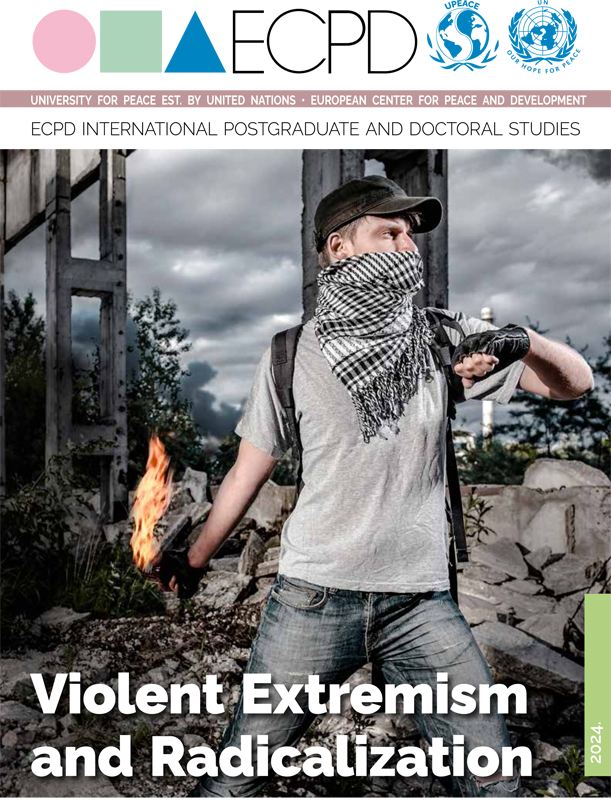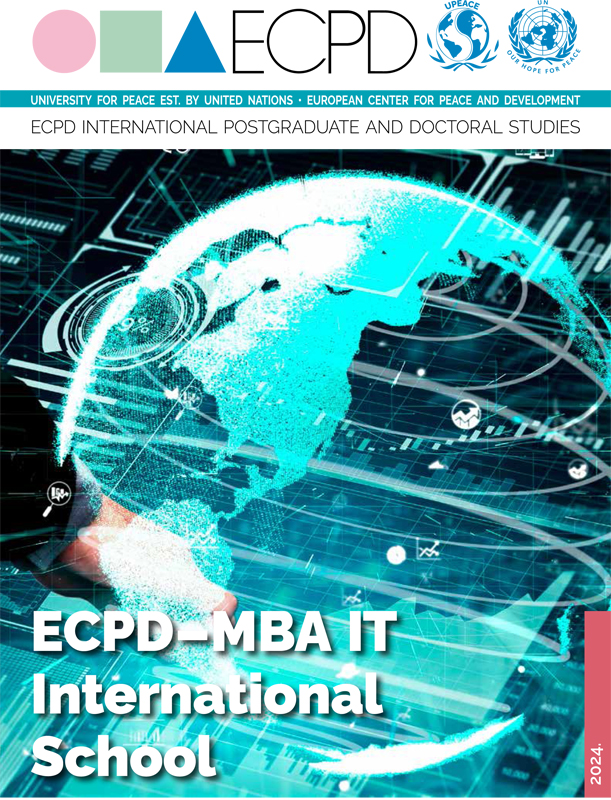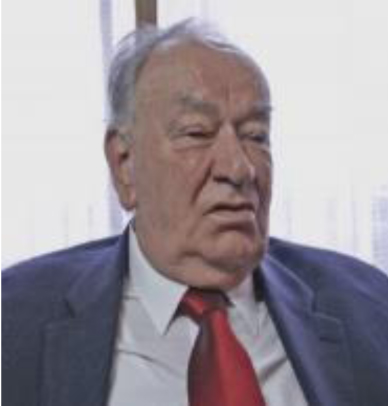
IN MEMORIAM
Academician Prof. Dr. Ljubiša Rakić
Vice President
European Center for Peace and Development (ECPD)
of the University for Peace est. by United Nations
(1931-2022)
Academician Ljubiša Rakić, a member of the Serbian Academy of Sciences and Arts and one of the most distinguished Serbian scientists in the field of medicine, died in Belgrade on 14 October 2022 after a short illness. His wife, Veselinka Šušić-Rakić (1934—2018), was also a doctor and professor at FM-Belgrade and a member of the Serbian Academy of Sciences and Arts. Their son Miodrag, is a doctor and professor at FM-Belgrade.
Ljubiša Rakić was born in Sarajevo on 11 April 1931 to mother Vukosava Nikolić and father Miodrag Rakić. He finished primary school in Sarajevo and graduated from high school in Belgrade in 1949. He graduated from the Faculty of Medicine (FM) in Belgrade in 1956 as one of the best students of his year. During his studies he was a demonstrator in physiology for 4 years and participated in research work.
After graduation he got a job as an assistant in the Department of Physiology and Biochemistry at FM-Belgrade, where he became assistant professor of physiology and biochemistry in 1961, associate professor in 1969 and full professor in 1974. Since 1971 he was professor of neurobiology at the Centre for Multidisciplinary Postgraduate Studies in the Field of Neurobiology at the University of Belgrade. From 1964 to 1979 he was director of the Biochemical Institute of FM-Belgrade. In the period from 1980 to 1984 he was Dean of FM-Belgrade. He retired in 1996 at the age of 65.
Professor Lj. Rakić studied scientifically and expanded his expertise at the Institute of Normal Physiology of Academician Pyotr Kuzmich Anokhin in Moscow (1956) and in the laboratory of Professors Horace Winchell Magoun and John Douglas French at the Brain Research Institute of the University of California, Los Angeles (1961-62), as well as аt several other laboratories in Yugoslavia and abroad.
He was a corresponding member of the Serbian Academy of Sciences and Arts (SASA) since 21 March 1974 and a full member since 15 December 1983. From 2008 to 2015, he was elected Vice-President of SASA, responsible for natural sciences. He has also been a member of a number of foreign academies and scientific societies, and was a member of the nominating group of the Nobel Committee for Science for two terms.
In the early 1960s he founded the Laboratory of Neurophysiology and Neurochemistry (now the Department of Neurobiology) at the Institute of Biological Research "Sinisa Stankovic" of the University of Belgrade and the International Laboratory for Brain Research in Kotor under the auspices of UNESCO and the National Institute of Health of the American government. He was scientific director of both research laboratories and collaborated for over five decades with dozens of scientists from many countries, especially from the U.S.A. and the Soviet Union.
Prof. Lj. Rakic is a member of numerous academies and scientific societies from the former Yugoslavia: the Serbian Academy of Sciences and Arts, the Montenegrin Academy of Sciences and Arts (1973), the Academy of Sciences and Arts of Bosnia and Herzegovina (1984), the Academy of Sciences and Arts of Kosovo (1978), the Academy of Sciences and Arts of Republika Srpska (2011). He was an external member of the Macedonian Academy of Sciences and Arts, the Academy of Sciences of USSR, the present Russian Academy of Sciences (1982), the New York Academy of Sciences, the Euro-Asian Academy of Sciences, the European Academy of Sciences and Arts based in Salzburg and the European Academy of Sciences, Arts and Letters based in Paris.
Professor Lj. Rakić had an extensive membership in professional associations. He was a member of the Society of Physiologists, Biochemists, Biophysicists, Clinical Neurologists-Physiologists of Yugoslavia, the International Brain Research Organisation IBRO, the Royal Society of Medicine in London and many other international societies for physiologists, biochemists, neurological sciences, neurochemists, biological psychiatry and other scientific organisations and associations. He was an honorary member of the All-Union Society of Physiologists and Biochemists of USSR Pavlov and the British Society for the Study of Brain and Behaviour. He was a member of the Scientific Society of Serbia since its foundation, European Society of Neurological Sciences, European Society of Neurochemistry, Serbian Medical Society, American Physiological Society, Brain Research Association (now British Neuroscience Association - BNA), honorary member of the Advisory Committee for Medical Research of the World Health Organisation in Geneva.
Professor Rakić's research encompasses the field of the central nervous system (CNS) and refers broadly to the study of the neurological basis of behaviour. He focused his research on the study of fundamental neuronal processes - excitation and inhibition – and viewed them from the perspective of the parameters of several scientific disciplines - neurophysiological, biochemical, immunological, evolutionary and biological-molecular. In general, his research activities and published results can be divided into seven groups: (1) regulatory mechanisms of CNS stimulation and inhibition, (2) biochemical organisation of the CNS, (3) biological rhythms in the brain, especially the study of the biological basis of paradoxical sleep stages, (4) research on neuroimmunology and brain plasticity, (5) evolutionary biochemistry and physiology of the brain, especially the regulatory role of nervous system mediators in the processes of early embryogenesis, (6) blood-brain barrier, (7) CNS and cancer and tumour gene therapy.
He participated with reports as an invited speaker in many international congresses of physiologists, biochemists, neurochemists, neurologists, etc. He also gave many invited lectures at universities and scientific institutes in the USSR, USA, UK, France, Poland, Hungary, Romania, Bulgaria, Italy, Germany, Egypt, Israel, Libya and Albania. Many young scientists from Yugoslavia and abroad were trained in the laboratories of Prof. Lj. Rakić.
Prof. Lj. Rakić published more than 500 scientific papers in integral form in prestigious Serbian and foreign peer-review journals (two thirds in foreign journals), mainly in the field of central nervous system physiology, 6 monographs abroad and 3 domestically, as well as 5 textbooks in collaboration, which experienced a total of 16 editions.
Within these laboratories, successful international scientific cooperation was established with numerous laboratories in the world (USA, France, England, Italy, Czechoslovakia, etc.), especially with laboratories and institutes in the field of central nervous system physiology in Russia (Institute of Developmental Biology of the USSR Academy of Sciences, Moscow, Institute of Evolutionary Physiology and Biochemistry of the Academy of Sciences of USSR, Leningrad, Pavlov Institute of Physiology of the Academy of Sciences of USSR, Leningrad; Brain Institute of the AMN of Russia, Moscow, Institute of Neurocybernetics of the State University in Rostov-on-Don, The Moscow Institute of Physiology, named after Prof. Ivan Sechenov, etc.). Most of the collaborations with Russian scientists took place within the framework of research projects that are part of the Protocol on Cooperation between the USSR Academy of Sciences and the Council of the Academy of Sciences and Arts of the SFR Yugoslavia.
Prof. Lj. Rakić was a participant in the Yugoslav liberation movement, a recipient of several state awards in the SFRY and the highest scientific awards in Serbia (Serbian Prize of the Seventh of July in 1968 and AVNOJ Award in 1977), as well as the Order of Labour Day Third Degree, the Order of Labour Day with Golden Wreath, the Order of ‘Fraternity and Unity’, the Peace Contribution Medal (1994) etc.
The Macedonian Academy of Sciences and Arts expresses also in this way, with the publication of the article In Memoriam in the MASA journal "Prilozi/Contributions", high respect and gratitude for the overall cooperation and support of Academician Ljubiša Rakić and the care and preservation of the memories of this great scientist and doyen of medicine in Serbia, the former Yugoslavia and beyond.
May he rest in peace and may his glory be eternal!
Prof. Dr. Doncho Donev
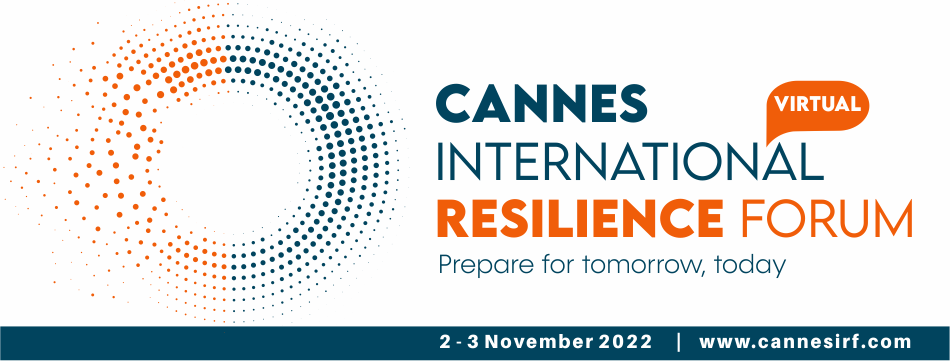
XIII ECPD INTERNATIONAL SPECIALIST SCHOOL
LATEST ACHIEVEMENTS IN PREVENTION, THERAPY
AND REHABILITATION OF ADDICTIVE DISEASES
with the main topic
IMPERATIVE OF REVITALIZATION
OF SOCIAL-PSYCHIATRIC PROGRAMS
Pula, 3 – 4 June 2022
ECPD Regional Center for Development Studies (Flaciusova 18)
The European Center for Peace and Development of the United Nations University for Peace (ECPD) had organized on 3 and 4 June 2022 in Pula the XIII ECPD International Specialist School „Latest Achievements in Pevention, Treatment and Rehabilitation of Addictive Diseases“ with the main topic „The Imperative of Revitalization of Social-Psychiatric Program“.
The opening of the School was heald at the City Hall of Pula and introductory speeches were given by Prof. Dr. Filip Zoričić, Mayor of Pula, Academician Prof. Dr. Negoslav Ostojić, Executive Director of ECPD and Prof. Dr. Zoran Zoričić, Director of the School and head of the Reference Center for Addictions of the Ministry of Health of the Republic of Croatia. The work continued at the ECPD Regional Center for Development Studies in Pula.
ECPD UN University for Peace implements this School within the framework of the International Program for the Transfer of Knowledge Systems in the Field of Medical Sciences. The aim of the School is to introduce the latest knowledge, practical and scientific achievements in the field of prevention, treatment and rehabilitation of addictive diseases in emergency situations to the participants - psychiatrists, psychologists, pedagogues, social workers and other experts.
Contemporary addictions in the era of postmodernism still have epidemiological rates, and the massive stress and trauma expressed through the consequences of the COVID-19 pandemic has brought new challenges, both to society, as well as to the psychiatrists and other professionals.
Addictive diseases directly or indirectly affect all phases of the life cycle of individuals and families, making it impossible for a person to fully function in the personal, family, professional and social spheres. And society in general bears numerous consequences due to abuse and addiction to psychoactive substances.
The main topics of this year's School were:
• Mass traumatism (COVID-19 pandemic) and addictive diseases
• Functioning of the mental health care system during the COVID crisis
• Practical aspects of cooperation among healthcare, social welfare and non-governmental organizations
• Digitization and addictive diseases in the 2030 UN Agenda
• Challenges of regulating the production, circulation and use of psychoactive substances
• Intergenerational trauma and addiction, and other topics.
The school was internationally and nationally accredited. On the basis of participation in classes and acquired knowledge during the work of the School, participants received an internationally valid ECPD Certificate of the United Nations University for Peace.
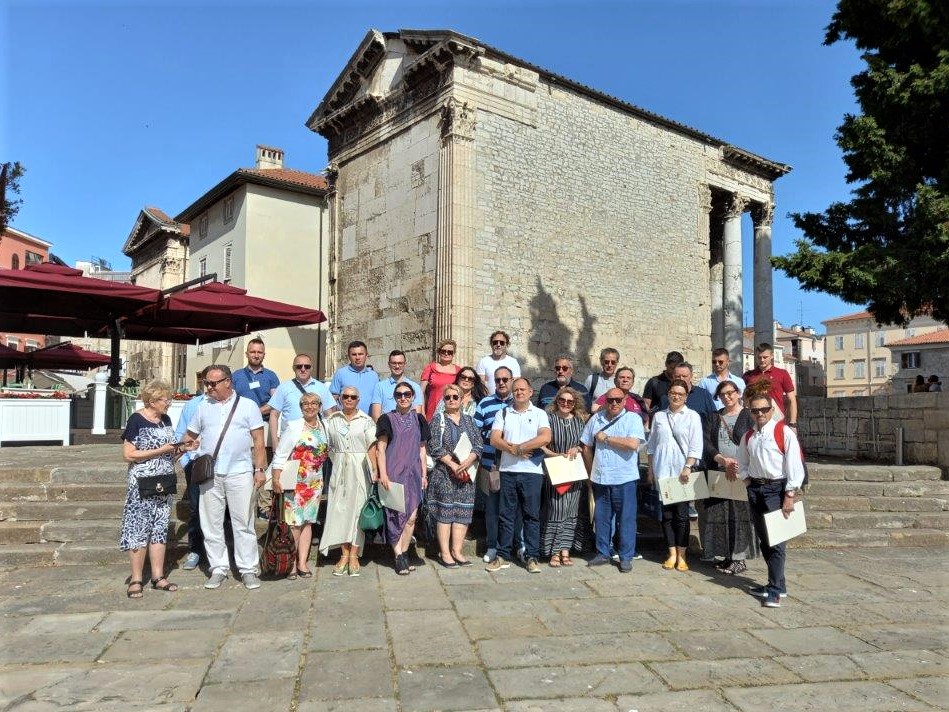
XXVII ECPD INTERNATIONAL SUMMER SCHOOL, Post
MANAGEMENT OF HEALTHCARE INSTITUTIONS
HEALTH CRISIS AND EMERGENCY MANAGEMENT and reflections on the COVID-19 PANDEMIC
Budva, 20 – 24 June 2022
Jeffrey Levett
Presentations were made by a wide variety of distinguished facilitators, on site and via Zoom (Italy, England, Germany, Greece, Finland, and Ukraine). They touched upon things past; smallpox in Yugoslavia 50 years ago and cholera’s entry into Europe though the Crimea, contemporary issues in the health sector; system dynamics, leadership, economics and various management models such as the EFQM Excellence Model and future problems; preparedness and auto immune systems failure. The School’s common denominator was an appraisal of the health sector’s response to the still unfolding COVID epidemic. Vaccines took central stage. A succinct probability of health damage to the overwhelming event of COVID to society was presented in terms of three multiplicative factors relating to the Hazard itself (war, earthquake, covid, austerity measures), to R the risk that the hazard will act and V is population vulnerability, which well-developed societal functions can manage, mitigate or hold in check. Health damage (HD) from an event is expressed as a probability (p), namely, p (HD) = ƒ [(Risk)X(H)X(V)]. What happens in the societal mind if covid is said not to exist, the vaccine becomes the hazard and government is seen to turn up the risk? It was a debated issue.
The objective of health disaster management is to prepare ahead of disastrous events, minimize damage should one occur and in its aftermath restore society to normalcy or better still, prevent disasters happening in the first place. It focused on the interrelationship between pre-Event preparedness of society (P) and vulnerability of the population (V).
A few school end messages: Health care must have a well-defined surge capacity with good emergency response and risk management to deal with crisis. Efficiency is crucial but effectiveness has a higher social value. System and staff resilience must be well protected and the healthcare leadership must develop policy to protect the psychological well-being of frontline staff in crises and systems in conflict as it becomes the norm. The future demands a before (preparedness), during (response) and after (rehabilitation) disaster event instrument. This was stressed in all descriptions of country responses.
XIII ECPD INTERNATIONAL SUMMER SCHOOL ON
CARDIOVASCULAR DISEASES
with main topic
PREVENTION, DETECTION AND MANAGEMENT
OF CARDIOVASCULAR DISEASES
(Hotel ʺSplendidʺ - Bečići, 20 - 24 June 2022)
The European Center for Peace and Development (ECPD) of the United Nations University for Peace organized the XIII ECPD International Summer School on Cardiovascular Diseases with the main topic “Prevention, Detection and Management of Cardiovascular Diseases”, which was held from June 20 to 24 at the Hotel "Splendid" in Budva.
The School was opened by introductory speeches of Academician Prof. Dr. Negoslav Ostojić, ECPD Executive Director, Academician Prof. Dr. Vladimir Kanjuh, Director of the ECPD Medical and Bio-Medical Studies, President of the School Council, President of the Committee for Cardiovascular Pathology SANU, Academician prof. Dr. Nathan D. Wong, School Director, University of California, Irvine, USA and Prof. Dr. Ian Graham, Co-Director of School, Trinity College Dublin, Ireland.
Lectures were also held by Academician Prof. Dr. Duško Vulić, Co-Director of the School, ANURS, Faculty of Medicine, University of Banja Luka, Academician Prof. Dr. Miodrag Ostojić, Co-Director of the School, SANU, Belgrade, Academician Prof. Dr. Senka Mesihović-Dinarević, President of the Committee for Cardiovascular Pathology of ANU BiH, Sarajevo, Prof. Dr. Dan Gaita, University of Medicine and Pharmacy, Timisoara, Romania, Prof. Dr. Milan Nedeljković, Clinical Center of Serbia, Faculty of Medicine, University of Belgrade, Prof. Dr. Branko Beleslin, Cardiology Clinic of the Clinical Center of Serbia, Belgrade, Prof. Dr. Mirza Dilić, Faculty of Medicine, University of Sarajevo, Prof. Dr. Milica Lazović, Faculty of Medicine, University of Belgrade, Prof. Dr. Ivan Tasić, Faculty of Medicine, University of Niš, Prof. Dr. Ivana Petrović, Institute for Cardiovascular Diseases "Dedinje", Belgrade and Dr. Alenka Prelc, Ljubljana.
The Program of the School included the following main topics:
• COVID-19 and cardiovascular diseases (CVD)
• Risk factors for CVD and European recommendations for prevention
• The obesity epidemic: strategies for prevention and control
• Cardiodiabetology
• Psychosocial factors and cardiovascular diseases
• Treatment of resistant hypertension
• Hypertension in children and prevention and control of cardiovascular diseases
• Prevention and treatment of heart failure
• Acute coronary syndrome - optimization of early management in invasively treated patients
• Early diagnosis of atherosclerosis and ischemic heart disease
• Rehabilitation of cardiovascular patients and other.
The School is internationally and nationally accredited by the European Board for Accreditation in Cardiology (EBAC) and the Health Council of Serbia. Based on the participation and the acquired knowledge and skills during the School, participants received an internationally valid Certificate of the European Center for Peace and Development of the United Nations University for Peace.
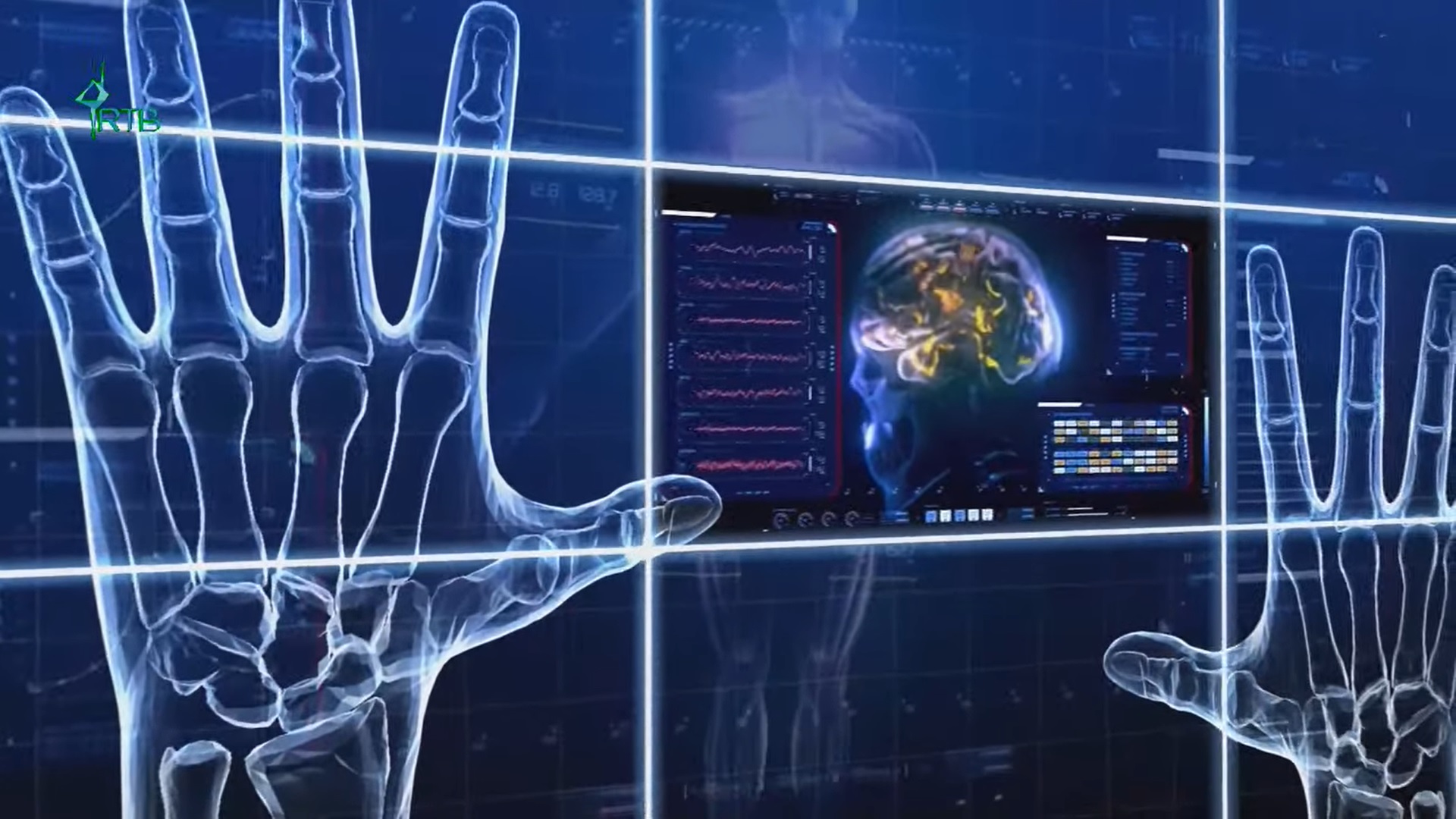
Posetite link
https://youtu.be/q3Cha_9xK0g
IDUĆA DVA DANA
U PULSKOJ GRADSKOJ VIJEĆNICI:
Međunarodna specijalistička škola o bolesti ovisnosti
02.06.2022 08:51 | Autor: Doria MOHOROVIĆ
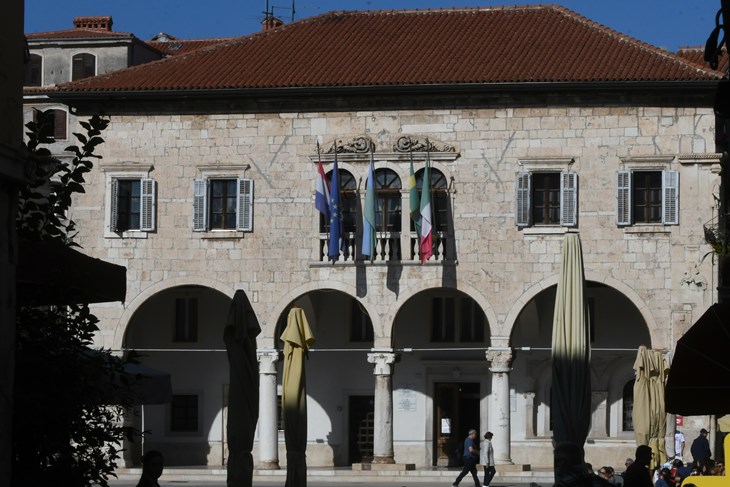
Iduća dva dana, 3. i 4. lipnja, Europski centar za mir i razvoj Univerziteta za mir Ujedinjenih nacija (ECPD) održat će XIII ECPD Međunarodnu specijalističku školu „Suvremena dostignuća u prevenciji, liječenju i rehabilitaciji bolesti ovisnosti” s glavnom temom "Imperativ revitalizacije socijalno psihijatrijskih programa".
Početak događaja zakazan je 3. lipnja u 10 sati u vijećnici Grada Pule, a Školu će uvodnim izlaganjima otvoriti pulski gradonačelnik Filip Zoričić, izvršni direktor ECPD i akademik prof. dr. Negoslav Ostojić te direktor Škole, predsjednik Hrvatskog društva za ovisnosti i voditelj Referentnog centra Ministarstva zdravstva Republike Hrvatske za ovisnosti prof. dr. Zoran Zoričić.
ECPD Univerzitet za mir UN-ovu Školu organizira u okviru Međunarodnog programa transfera sistema znanja u području medicinskih znanosti. Njezin je cilj da polaznike - liječnike, pedagoge, psihologe, socijalne radnike i druge stručnjake upozna sa najnovijim saznanjima, praktičnim i znanstvenim dostignućima u području prevencije, liječenja i rehabilitacije bolesti ovisnosti u izvanrednim situacijama.
Središnje teme ovogodišnje škole su digitalizacija i bolesti ovisnosti u Agendi 2030 UN, trendovi i problematika droga u Hrvatskoj, funkcioniranje sistema zaštite mentalnog zdravlja tokom COVID krize, dualni poremećaji u vrijeme epidemije COVID-19, multidisciplinarni pristup liječenju žena u ovisnosti, praktični aspekti suradnje zdravstva, socijalne skrbi i nevladinih organizacija, izazovi regulacije proizvodnje, prometa i upotrebe psihoaktivnih supstanci i drugo. Polaznici će nakon završene Škole dobiti međunarodni Certifikat ECPD Univerziteta za mir Ujedinjenih nacija.
preuzeto sa https://www.glasistre.hr/pula/u-pulskoj-gradskoj-vijecnici-medunarodna-specijalisticka-skola-o-bolesti-ovisnosti-799895
ORDER OF THE RISING SUN
FOR PROFESSOR LJILJANA MARKOVIĆ, PhD
date 29th April, 2022 10:18
Prof. Ljiljana Markovic, PhD, the most prominent Japanese Studies scholar and a Full Professor of the European Centre for Peace and Developmen ( ECPD ) of the United Nations University for Peace, and a Special Advisor to the Executive Director, has been awarded The Order of the Rising Sun - Golden Rays with a Rosette for 2022, an Imperial Decoration awarded by the Government of Japan for "outstanding contribution to establishing and improving friendly relations with Japan." On Friday, April 29, 2022 (Japanese time), the Government of Japan announced the names of foreign winners of Imperial Decorations for this year. The only winner from ECPD United Nations University for Peace is prof. Ljiljana Markovic, PhD.
THE ORDER OF THE RISING SUN - GOLDEN RAYS WITH A ROSETTE
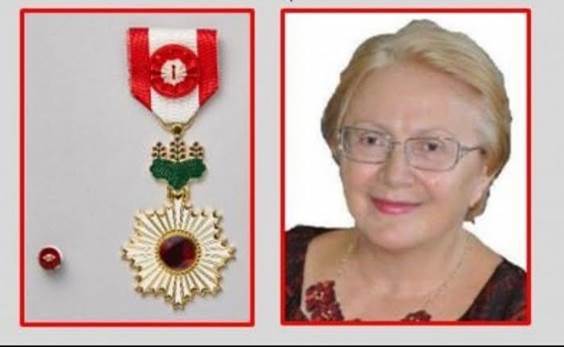
Prof. Ljiljana Markovic, PhD, had been previously awarded by the Government of Japan in 2010 another exceptional recognition - the Award of the Minister of Foreign Affairs of Japan (Gaimu Daijin Sho) – for a special contribution to the development of Japanese Studies as a scientific discipline and the promotion of japanese culture in the world. She had been educated at Girton College, University of Cambridge (she graduated from the Faculty of Economics and Political Science and the Faculty of Oriental Studies, where she also received her master's degree) and Chuo University, Tokyo (where she received her doctorate). During her decades-long career, she has made an immeasurable contribution to the development of Japanese Studies as an academic discipline, as well as to the development and improvement of study programs aimed at studying Japanese language, literature and culture at the Faculty of Philology, University of Belgrade. She is a Visiting Professor at Toho University, Osaka University and Gabrielle d`Annunzio University.
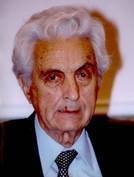
IN MEMORIAM
Academician Prof. Dr. Branislav Šoškić
Dear ECPD Members, Friends, Postgraduates and PhD Candidates,
It is with great sadness that we announce to you the passing of Academician Prof. Dr. Branislav Šoškić, one of the main pillars of this international educational and research organization, a prominent professor since its first days as, Dean, Rector and President of the Scientific and Education Board of the ECPD University for Peace established by the UN. In his extremely rich career, Academician Šoškić held different high-ranking positions, including, inter alia, that of the President of the Republic of Montenegro, President of the Montenegrin Academy of Sciences and Arts, President of the Yugoslav Economic Academy, a member of European Academy of Sciences and Arts and many other prestigious national and international functions.
Academician Šoškić left an impressive record as a most distinguished professor and well-known theoretician in the Yugoslav Economics, marked by extraordinary work, dignity and integrity. We will remember him forever as our sincere friend who possessed the best human virtues.
Academician Šoškić graduated from the Faculty of Economics in Belgrade (1951), and received his Ph.D. (1954). He pursued his post-doctoral studies at the Universities in the United Kingdom (St Andrews and Cambridge) (1955-1957) and in the United States (Harvard and California Universities) (1962-1963). On a number of occasions, he was invited to lecture at universities abroad, mostly in the United States. He was the guest of foreign Academies of Sciences and universities where he lectured and presented a large number of scientific papers and statements at symposia (Paris, Sofia, Bratislava, Rapallo, Venice, Moscow, Salzburg, Warsaw, Prague, Poznan, Weimar, Budapest, Plzen, Berlin, Rostov, Geneva, Berkeley, Leningrad, Sorento, New Delhi, Bombay, Bangalore, Madras, Calcutta, Vienna, Bucharest, Lubbock, Dar es Salaam, Morogoro, Seychelles, Beijing, etc.).
He published over 400 scientific and professional works, books, monographs, studies and handbooks, collected works, scientific papers and statements (presented at Yugoslav and international symposia), articles and other texts in Serbian and foreign languages (English, French, Russian, Spanish, German, Italian, Czech, Polish, Bulgarian, Albanian). His widely known books are: The Evolution of Economic Thought (awarded by Belgrade University)(1965, 1968, 1970, 1972, 1974, 1978); Production, Employment and Stabilization (1970, 1972, 1973); Income Distribution in a Market Economy (received the October Award of Belgrade (1971, 1974); Theory of Value – Classical Economic Analysis (1971); Economic Analysis I and II (1972, 1973); Economic Cost of Education (1974, 1983); Economic Doctrines (received The 13 July Award) (1975, 1976, 1980, 1983); Modern Economic Analysis (1978); Economic Thought and Economic Policy (1978, 1980, 1989); The Evolution and Fundaments of Contemporary Economic Thought (1986, 1988, 1990); Currents of Economic Thought (1992); Economic Thought – Evolution and Modern Principles (1995).
Academician Branislav Šoškić had previously been a professor and Dean of the Faculty of Economics, University of Belgrade, as well as a Distinguished Fulbright Visiting Professor at several American universities.
The funeral will take place on Friday, 8 April at 11.30, at Novo groblje.
Repose in Peace, dear Friend, in Eternal Glory!
Cabinet of the ECPD Executive Director
European Center for Peace and Development
University for Peace est. by United Nations
ECPD Delegation in Greece
Early this year a small ECPD delegation to Greece discussed issues of cultural, health and digital diplomacy, e-Health and vaccine hesitancy. It was an initial meeting and evolved as a series of brainstorming events and meetings with NGOs, one with the World Philosophical Forum and an interaction of the Russian members of the delegation with their Greek counterparts. The end result was a brief common statement on proposed future activities within a World Forum under development by the ECPD UN University for Peace with Russia and the 13th World Philosophical Forum, Athens, 2022.
The meeting also accommodated a discussion on the dwindling years to achieve the Sustainable Development Goals (SDGs) and the vital need to end poverty and hunger, achieve food security for the most vulnerable and strengthen multilateralism. It is mandatory to bring about change that will make a positive difference in people’s lives by the implementation of nationally-owned inclusive and sustainable development strategies promoting wellbeing and dignity of all. ECPD is deeply committed to the 2030 Agenda. The Russian delegation requested that JL on behalf of the ECPD will enter the upcoming session oof the United Nations 60th Commission for Social Development (CSocD60), 7-16 February 2022 https://bit.ly/un-csocd60.
Participants were from ECPD, Parliamentary Centre, Russian Federation and its Greek counterpart, Russian homeland security, wpf, universities and NGOs. Dr. Dmitry Edelev Councilor to President of the International Association of Peace Foundations the ECPD and Chinese and Russian universities project International network

Jeffrey Levett, ECPD; Sergey Kharkov, Editor/ Peter Kapsaskis, Viktor Fersht UN and Uof Moscow

IN MEMORIAM
H.E. Prof. Dr. Erhard Busek
Dear ECPD Members and Friends,
With profound grief and a heavy heart, we deeply regret to announce that our long-standing distinguished member of the ECPD Council and close friend and prominent ECPD Professor, H.E. Erhard Busek, Former Vice.Chancellor of The Republic of Austria, passed away on 13th March, 2022. Both at the level of the institution and each of us personally, it has been an honour and a privilege to enjoy the opportunity of working with Professor Busek and following his wise guidance in a multitude of situations. His impressively rich career which included the highest and most responsible positions throughout his life in helping build and fortify the European Union was also often connected with the Balkans. He will be remembered, among all other accomplisments, for his valuable contribution to this part of Europe, as a prominent champion always striving for peace, tollerance, international cooperation, solving disputes by diplomatic negotiations and a brighter future for all peoples.
On behalf of the European Centre for Peace and Development of the University for Peace est. by UN which Professor Erhard Busek actively supported for many years, until his last days, we express deep and heartfelt condolences to his family and closest business associates. Prof. Busek has been a prominent member of the ECPD Council, Rector of the Salzburg University of Applied Sciences, President of the Vienna Economic Forum, Jean Monet Chairman, President of ICEUR , the International Center for Advanced and Comparative EU-Russia Research in Vienna, Chairman, Vienna Peoples Party, Minister for Education, Minister for Science and Research, Chairman, Institute for Danube Region and Central Europe, Coordinator of the Southeast European Cooperative Initiative SECI, Special Coordinator of the Stability Pact for South Eastern Europe, as well as the heart of many more key institutions that have been active in shaping the world.
Our thoughts and hearts go with our esteemed Professor Erhard Busek whose noble deeds will remain with us forever. He shall be truly missed in all our future activities and shall never be forgotten.
Repose in Peace, dear Friend, in Eternal Glory !
Cabinet of the ECPD Executive Director
European Center for Peace and Development
University for Peace est. by United Nations
ART 010/22
War in Ukraine: diplomacy with a veto?
https://www.other-news.info/noticias/guerra-en-ucrania-diplomacia-con-veto/
Without the least intention to decrease Putin’s responsibility, we should consider - with as much urgency and stamina as possible - which have been the causes of this war and other conflicts, of the existence of nuclear weapons, plutocratic governance, global threats that are potentially irreversible... We should ask ourselves why Europe - that was deemed to play an important qualitative role on a global scale - was not even present as a speaker, because it was absorbed by the NATO... the North Atlantic Treaty Organisation... which extends eastwards and speaks in the name of European citizenship... We have the duty to remember.
We must remember which were the reasons that gave rise to the Second World War - the Aryan, Roman and Japanese supremacism, because the League of Nations had been abandoned by the United States from the very beginning- ... We should take into account that it was the veto of the victors which made Roosevelt's excellent multilateral design of the United Nations to be considered useless... “We the peoples... are determined to save future generations from the scourge of war"...
We have just had a new evidence of the irrelevance of the United Nations, because 196 countries are fully dependent on the will of five countries... And the same can be said of the European Union that must adopt all its decisions unanimously, a rule that leads to 27 vetoes because unanimity is the antithesis of democracy... And this is why it is the NATO who speaks in the name of Europe.
All crises may potentially become an opportunity for change. The current crisis, whose origin was the reason of force, could become an incentive for a great global movement in favour of the force of reason, of mediation, of word, of democratic multilateralism at a global scale, allowing - once the possibilities for action have been exhausted when faced to global irreversible threats - to the effective implementation of the 2030 Agenda and the Agreements on Climate Change.
Yes: now, for the first time in history, the recognition of the equal dignity of all human beings is about to be achieved, without any discrimination based on gender, ethnicity, ideology, belief, sexual sensitivity... Now, for the first time in history, human beings can express themselves freely, now thanks to digital technology and they can therefore participate, which is the basis of democracy... Now, at last, when we are finally aware of the present situation and trends - “We, the peoples” may raise our voice and fulfil our essential responsibilities towards future generations... We can no longer be abducted by the immense power of the media - "a weapon of mass distraction", according to Soledad Gallego's accurate definition and warning-. We shall never again be mere spectators, but rather actors of the great transition from a culture of imposition, domination, violence and war to a culture of encounter, dialogue, conciliation, alliance and peace.
It is a duty of memory to take resolute action. It could become a crime of silence. The time has come for a great global coalition, led by women and
youth, for the sake of peace and non-violence, of conflict resolution within the context of a democratic multilateralism that shall supersede the governance of the G6, G7, G8 and G20.
A global coalition whose aim is to achieve the great transition from force to word, by reshaping the United Nations through a change in the composition of its General Assembly, so that “the peoples” are truly represented with 50% of its representatives belonging to the civil society, and the rest of its members (the other 50%) representing the States, and with the veto being replaced by well-weighted and balanced percentages...
Yes “We, the peoples” shall at last be able to look into the eyes of our descendants and tell them that we shall not leave behind a Planet whose habitability has been deteriorated; that nuclear warheads shall be immediately disposed of; tax heavens shall disappear and the huge amounts currently devoted to territorial defence shall also be used to ensure human and food security, water, health, education, environmental protection - of the inhabitants of these well-protected territories...
To achieve these pressing transformations, it is essential to eradicate imposition and establish democracy: democracy on a personal, local, national, regional and international scale. Just as in 1948 the United Nations adopted the Universal Declaration of Human Rights, the renewed United Nations could adopt a Universal Declaration of Democracy (1) to address and to solve the problems of the new era.
1 https://declaraciondemocracia.wordpress.com/declaracion-democracia-2/
We consider Putin’s decision as the main reason, but we don’t neglect other issues that are regrettable or the need to redirect Ukraine’s conflict. We can turn them into an opportunity for change if the awareness of what has happened in the past pushes us to quickly change so that it is, at last, "We the peoples" who take the reins of our common destiny into our own hands.
Federico Mayor Zaragoza
26 February 2022.























